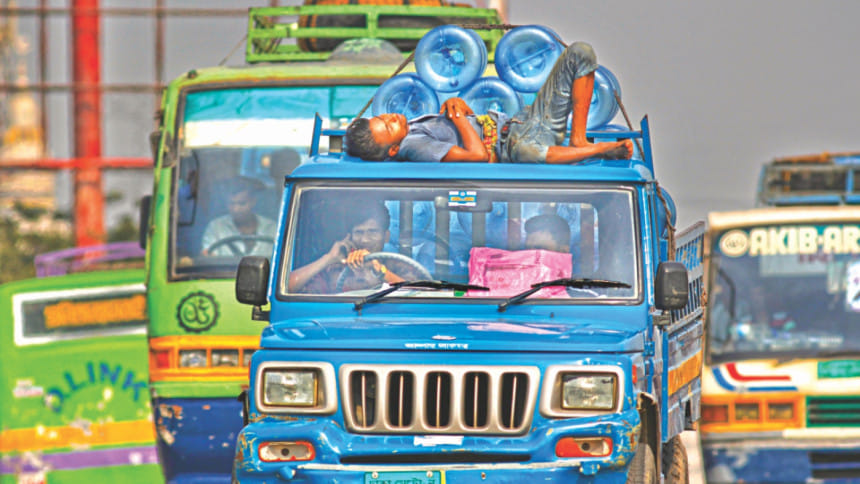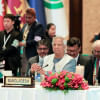Troubles of Bangladesh's transport workers

The usual eight-hour working time a day is not applicable for him. He has to work almost double the time.
Mohammad Shumon, helper of a local bus, wakes up at 5:30am and toils at least until 11:00pm.
He starts his day by sweeping and cleaning the bus, checking tyres and the engines of the vehicle that will run on the city streets all day.
After the bus hits the road, he has not a single moment to relax. Till midnight he hollers on the top of his voice, calling passengers and helping the driver.
Rain or shine, Shumon is on the bus doing his job.
But he has to face public wrath, and even physical assaults from passengers over fare, slow movement of the bus and additional passengers.
Shumon gets just Tk 350 to 400 for his 16 to 17-hour workdays.
“I don't want to take days off because the bus owner won't pay me for those days,” he said while talking to The Daily Star at the capital's Phulbaria Bus Terminal on the night of April 28.
“I have to send a major portion of my earnings to home. So I can neither take proper food nor afford accommodation,” said Shumon, who works for a local bus plying Gulistan-Abdullahpur route.
The 20-year-old sleeps in the bus, takes food from roadside restaurants and uses public toilets at Phulbaria.
Like Shumon, several thousand workers of buses plying the streets in the capital have the same story to tell.
Against such a backdrop, Bangladesh observes May Day today through different programmes organised by the government, labour rights organisations and workers' platforms. The day is a government holiday.
The condition of truck drivers is worse than that of bus drivers as the former are paid on commission for trips.
For example, a person or company hires a truck for Tk 30,000 to carry goods to Chittagong from Dhaka. Usually, workers get 10 percent of the amount, which is Tk 3,000. This money is divided between the driver and the helper.
“In many cases, owners do not even want to pay 10 percent commission. They often bargain for 8 percent,” said Millat Hossain, a truck driver at the capital's Tejgaon truck terminal.
If there is a gridlock on highways, it takes around two or three days to reach the destination, he said. But the wage remains the same.
“We work long hours, but our pay is poor. We even have to sleep in the truck and use public toilets while travelling from one district to another,” Jahangir Alam, another truck driver, told The Daily Star.
As per Motor Vehicles Ordinance, 1983, drivers are supposed to drive for a maximum of eight hours a day with 30 minutes break every five hours, said Nurul Islam, director (engineering) of the Bangladesh Road Transport Authority (BRTA).
Besides, transport workers' wages have been fixed by the Bangladesh Labour Law, said Osman Ali, general secretary of Bangladesh Sarak Paribahan Sramik Federation.
But the rules were not followed as there was negligence on the part of transport owners and a lack of monitoring by the authorities concerned, alleged Osman Ali.
Even, vehicles owners do not issue any appointment letters to the workers, he said.
In response, Faruk Talukder Sohel, chairman of Bangladesh Bus-Truck Owners' Association, claimed that the workers do not want to take appointment letters because they do not want to follow discipline.
“Rather, they bargain with owners for their wages,” said Sohel, also the managing director of Sohag Paribahan Ltd.
About working hours, he said it needs at least two sets of drivers and helpers for an inter-district bus to complete a round trip, which is not possible under the existing passenger fare.
Currently, around 6,000 buses and minibuses ply Dhaka and Chittagong cities, while around 70,000 buses ply different inter-district and long-haul routes. There are 1.27 lakh truck and lorries, according to transport operators.
Around 40 lakh workers are directly or indirectly involved in the road transport sector in the country, according to the Sramik federation.
The last time the government revised the wages of road transport workers was in 2005.
At that time, the minimum wage for drivers was fixed at Tk 12,000; for contractors Tk 8,000 and for helpers Tk 6,000. But the owners do not follow it, alleged Osman Ali.
Wages are supposed to be revised every five years. Although 10 years have passed, the wages of workers have not been revised yet, he said.
Contacted, MA Kashem Masud, joint secretary of the Ministry of Labour and Employment, said that if any worker thinks he is being deprived, he can lodge complaints with the labour court.
About the revision of the wages, he said the government was working on it.
WATER TRANSPORT WORKERS' WAGE
The government on April 26 proposed to fix Tk 9,000 in minimum wages for water transport workers following a six-day strike enforced by the workers who demanded, among other things, a pay hike.
However, vessel owners did not agree to the proposed wage, and the next day, cargo vessel owners stopped operating their vessels in protest against the hike.
“A worker works round the clock no matter whether the vessel is operational or anchored. Moreover, workers operate vessels in rough weather, risking their lives. But still, owners do not want to pay their due wages,” said Chowdhury Ashiqul Alam, general secretary of Bangladesh Water Transport Workers Federation.
Around 1,100 registered passenger vessels and 3,000 cargo vessels operate in the country. Besides, over 15,000 different types of unregistered vessels also ply the waterways. Around 2 lakh workers are engaged in these vessels, according to vessel workers and owners.

 For all latest news, follow The Daily Star's Google News channel.
For all latest news, follow The Daily Star's Google News channel. 








Comments